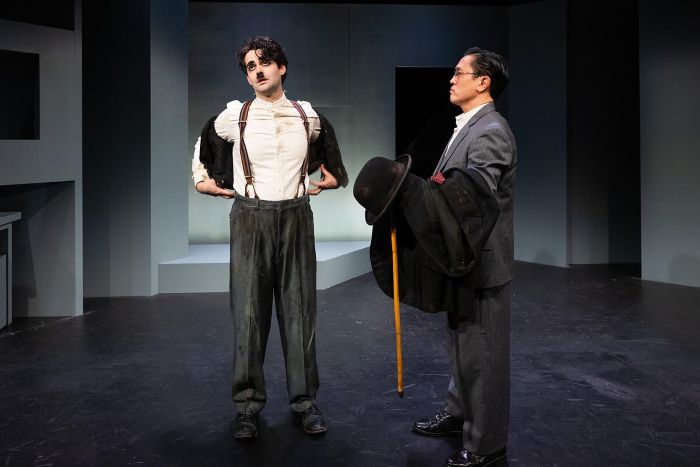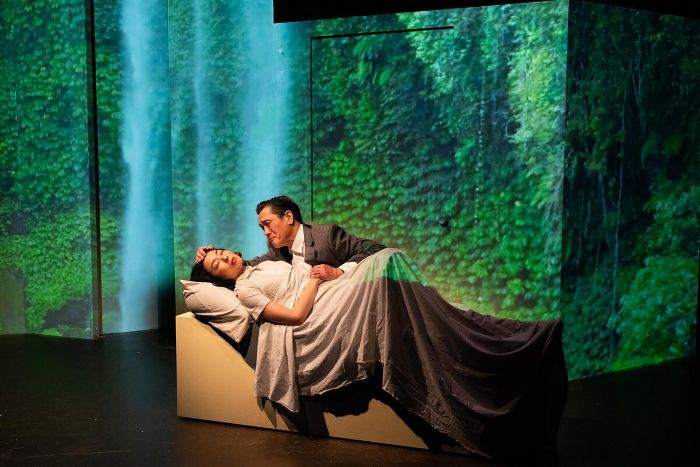Now in its 48th season, Pan Asian Repertory Theatre, with a mission of providing professional opportunities for Asian American artists and creating new works focused on issues of social justice, presents the world premiere of playwright Philip W. Chung’s My Man Kono for a limited engagement at A.R.T./NY’s Mezzanine Theatre. The narrative, based on exhaustive historical and biographical research and the release of the real-life subject’s personal papers by his family, follows the journey of Japanese émigré Toraichi Kono (1885-1971), who, after moving to California in pursuit of the American Dream, became the chauffeur, valet, secretary, friend, and confidante of Charlie Chaplin for two decades at the height of the silent film era (even appearing on film with Chaplin). But his dream turned into a nightmare, when he became a victim of anti-Japanese hate and hysteria at the outset of WWII, was arrested by the FBI on suspicion of espionage, held in an internment camp, released in 1949, and returned to Japan in the 1950s.

Opening with a silhouetted Chaplin entering the stage and performing a silent scene in his legendary style, the chronological presentation of the key episodes and figures in Kono’s life from 1903-61, in both the US and Japan, beginning with his initial meeting with the British-born Hollywood star, is interspersed with flashback re-enactments of his memories, and, in his ultimate court appeal for release and the dismissal of the charges brought against him, the conflicting accounts of others.
Under the active direction of Jeff Liu, a cast of eight, six appearing in multiple roles and popping up at different levels of the set, delivers the dramatic rise and fall of Kono, his relationship with Chaplin that brought him to the heights of success and economic security (which ended abruptly after 20 years with the arrival of Chaplin’s third wife Paulette Goddard), the incessant ethnic slurs he continually faced, the relentless presence of the press, the loss of his own wife Isami, leaving him with two children, the resultant financial troubles that eventually led him into an import-export business with Japan, the subsequent US sting operation targeting him to pass on falsified information to a contact in his native land, and his calculated internment on charges of espionage.

In the titular role of Kono, Brian Lee Huynh gives an even-handed (and sometimes, at the early press preview I attended, slow and hesitant) portrayal of the man’s virtues and flaws, from his youthful abandon to his growing hard work and ambition, dedication to Chaplin and tender devotion to his own wife, and his often poor decisions that culminated in his downfall (like assuming his boss, with whom he never again had contact, would choose to support him over Goddard, and unintentionally serving in some capacity as a contact with the Japanese forces). Chaplin is embodied by the outstanding Conlan Ledwith, who flawlessly mimics his iconic moves and stylings and also captures his less familiar off-stage personality and his significant effect, both good and bad, on Kono’s life (he also plays the judge who presides over Kono’s court battle). The two leads are supported by Robert Meksin as Wayne Collins, the impassioned civil rights lawyer who took on Kono’s case (along with those of thousands of other Japanese clients during and after WWII) and was the only one who believed and supported him when most people abandoned him.
In the featured roles of those involved in the sting are James Patrick Nelson as FBI Agent R. Horn, Cody LeRoy Wilson as the venomous opportunist Alva Blake, who hurls racist epithets at Kono after he declines to introduce him to Chaplin in his early days, then gets his revenge by later passing on the fake information from the US Navy to him, and Jae Woo as the Japanese commander Itaru Tachibana, who receives it (with each of the three performing additional minor roles). Rounding out the company are Emma Kikue as a controlling Paulette Goddard, who causes the irreparable rift between Kono and Chaplin (and is also seen as other figures from Hollywood and the press), and Kiyo Takami as the gently strong and insightful Isami, and subsequently as the female prosecuting attorney, who triggers Kono’s vision of his late wife.

The period drama is enhanced with an effective artistic design, with costumes of the era, including a spot-on recreation of Chaplin’s famous look, by Karen Boyer; lighting by Asami Morita that shifts from narrative to flashback scenes to the flashes of the press photographers’ cameras, with sound and original music by Howard Ho; fight choreography by Michael G. Chin that erupts in key segments; an efficient multi-level set by Sheryl Liu, with openings that allow for easy entries and exits and movable furniture that transitions fluidly to the changing locales; and projections by Cinthia Chen that further identify the places, times, and themes of the show.
With the shocking rise in anti-Asian hate crimes and the current administration’s targeted deportation of immigrants in the US, My Man Kono is a story that resonates today and sends a clear message of the harrowing impact of racism and bigotry.
Running Time: Approximately two hours, including an intermission.

My Man Kono plays through Sunday, March 9, 2025, at the Pan Asian Repertory Theatre, performing at A.R.T./NY’s Mezzanine Theatre, 502 West 53rd Street, NYC. For tickets (priced at $35-70, plus fees), go online.



